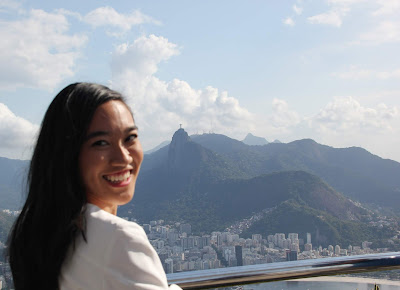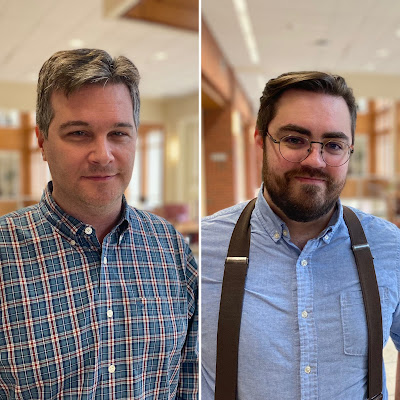Engineers in Brazil: A Student's Perspective From Experience in Rio de Janeiro
 |
| Noelle Vargas - May 2018 |
“People change people: that is the secret of life.” – Mark Blutman
Who are we? What impact do we want to leave on our world? The definition of “our world”- what does that encompass? As an OU student, our eyes stretch from the residential towers down the South Oval to the engineering quad. However, there is more to our world than the twenty minute hike across campus. It is easy to claim that as a student “our world” is focused on improving ourselves academically and climbing organizational hierarchies. However, there is more to our world and there is more to what we can offer. Our brain for nine months in a calendar year, is focused on increasing knowledge to pursue a career in our desired field. But what world do we desire to impact through our career? Our world is bigger than OU’s campus - bigger than Norman - bigger than Oklahoma - and even bigger than the United States. This seems statistically obvious: a world is bigger than a country. However, how many times do we actually take a step back and consider the entirety of our world? We, especially myself, get too caught up in our own lives that we do not know about the lives experienced elsewhere.
-->
Studying abroad provides the opportunity to widen our horizons and have another culture seep into our character. “Engineers in Brazil” is unlike any program. From the beginning of the program, our professors, Dean Mike Stice and Dr. Robert Huck ingrained in us, the students, that we were taking part in more than just the courses of Engineering Professional Development and Introduction to Petroleum Engineering; we were also actively incorporating culture into the classroom. We were opening our minds and hearts to the world and its reachable possibilities. Education is not a four-year journey - it is a lifetime of learning. We were encouraged to observe and analyze the similarities and differences between our United States culture and the Brazilian culture, rather than categorizing in our heads which is better. Before traveling to Rio de Janeiro, there were many precautionary statements about pickpocketing, diseases, infections bugs, and questionable safety. Rather, I found the areas we traveled to within the state of Rio de Janeiro – including Rio de Janeiro (City), Leblon, Ipanema, Copacabana, and neighboring cities – to be safe with locals who showed the utmost care and openness to help. English was definitely not a spoken language in the state of Rio de Janeiro, but the locals that we met, truly tried to help us when we were lost or confused tourists. There are many assumptions made about other places of our world. However, it is only when we become bold and take the risk to come face-to-face with the new place that we can make our own conclusions about a country and become global citizens.
Realizing we had the opportunity to engage with the local citizens excited me even before heading onto a plane for Brazil. We met Brazilian engineering students from the Pontifical Catholic University of Rio de Janeiro (PUC-Rio) and high schoolers from the American School of Rio de Janeiro. They gave us their own insight on their Brazilian culture while sharing their respective aspirations in the engineering field. What I thoroughly enjoyed even more was how easy the flow of conversation was. We were all either in our twenties or late teens who had the same interests and passions as we shared the Millennial culture. They shared with us things to do, places to go, and food to eat in Rio de Janeiro while we told them vice versa the things to do in Oklahoma and the United States. Accompanied by the PUC-Rio engineering students, we traveled across the state to Halliburton, Baker Hughes a GE company, INMETRO, Enel, and many other engineering companies. There, we learned about the work of the professional engineers in their respective companies living in Brazil.
Realizing we had the opportunity to engage with the local citizens excited me even before heading onto a plane for Brazil. We met Brazilian engineering students from the Pontifical Catholic University of Rio de Janeiro (PUC-Rio) and high schoolers from the American School of Rio de Janeiro. They gave us their own insight on their Brazilian culture while sharing their respective aspirations in the engineering field. What I thoroughly enjoyed even more was how easy the flow of conversation was. We were all either in our twenties or late teens who had the same interests and passions as we shared the Millennial culture. They shared with us things to do, places to go, and food to eat in Rio de Janeiro while we told them vice versa the things to do in Oklahoma and the United States. Accompanied by the PUC-Rio engineering students, we traveled across the state to Halliburton, Baker Hughes a GE company, INMETRO, Enel, and many other engineering companies. There, we learned about the work of the professional engineers in their respective companies living in Brazil.
Traveling to a new continent, not speaking the language, and not knowing the other OU students and faculty members defines chaos for me. Honestly, I was scared about how I was going to connect with the 14 others on this study abroad adventure. However, it is at the very edge of chaos where one experiences the finest learning. We were 15 people who were on a new experience and territory, which led us to seek a “home” within each other. What amazed me was how we were able to trust each other enough to be raw. We were all living together for two weeks and every emotion was experienced. We saw each other in our hypest of times, groggiest of times, and all other emotions in between. This is what makes studying abroad so unifying - we trusted each other and felt secure enough to be open and show the deep layers of our character. I never thought I would grow to appreciate and become greatly fond of a group of people so quickly.
As students, this two week summer program taught us to embrace culture. It is important that we incorporate the positive aspects of another culture, the Brazilian culture, learned elsewhere into our own culture and lives in the United States. Through observing the Brazilian culture, I learned to always keep an open eye and hand to those surrounding me and recognize when they need help. I learned that the United States culture is not the only culture in our world and that we cannot think it is better than the rest. I learned that the competitive culture and thoughts of “How can I be the best, be on top, and beat everyone else?” is the wrong perception. Through studying abroad in Brazil, I was quick to learn that not everyone in our world thinks about their own personal progression in life, but instead looks around and seeks assisting others in the progression of their lives. One day, we will become professional engineers who will work with colleagues who could be from any of the continents in our world. In any engineering company, one will always recognize that engineering is a profession that has racial diversity. “Engineers in Brazil” taught us that world peace will be achieved through interpersonal relationships. It taught us that in order to leave an impact in anything we must become global citizens and combine leadership, culture, and positive change together. We left Rio de Janeiro with a broader insight to the world and the urge to meet more of it. We left with desire burning in us to impact our world, create those interpersonal relationships, and create world peace. We departed Brazil with the possibility of questioning the unquestionable. The best part is that as a student, you can see in the eyes of both professors the belief they had in us, the students and our generation. They believed in the capability of young, bright engineers who when posed with an issue will strive to fix it.
As students, this two week summer program taught us to embrace culture. It is important that we incorporate the positive aspects of another culture, the Brazilian culture, learned elsewhere into our own culture and lives in the United States. Through observing the Brazilian culture, I learned to always keep an open eye and hand to those surrounding me and recognize when they need help. I learned that the United States culture is not the only culture in our world and that we cannot think it is better than the rest. I learned that the competitive culture and thoughts of “How can I be the best, be on top, and beat everyone else?” is the wrong perception. Through studying abroad in Brazil, I was quick to learn that not everyone in our world thinks about their own personal progression in life, but instead looks around and seeks assisting others in the progression of their lives. One day, we will become professional engineers who will work with colleagues who could be from any of the continents in our world. In any engineering company, one will always recognize that engineering is a profession that has racial diversity. “Engineers in Brazil” taught us that world peace will be achieved through interpersonal relationships. It taught us that in order to leave an impact in anything we must become global citizens and combine leadership, culture, and positive change together. We left Rio de Janeiro with a broader insight to the world and the urge to meet more of it. We left with desire burning in us to impact our world, create those interpersonal relationships, and create world peace. We departed Brazil with the possibility of questioning the unquestionable. The best part is that as a student, you can see in the eyes of both professors the belief they had in us, the students and our generation. They believed in the capability of young, bright engineers who when posed with an issue will strive to fix it.







